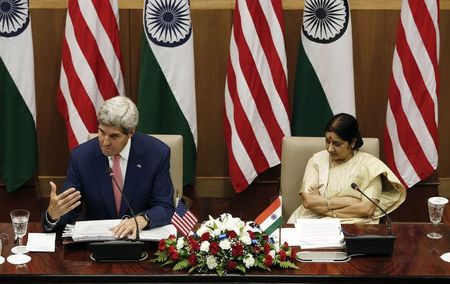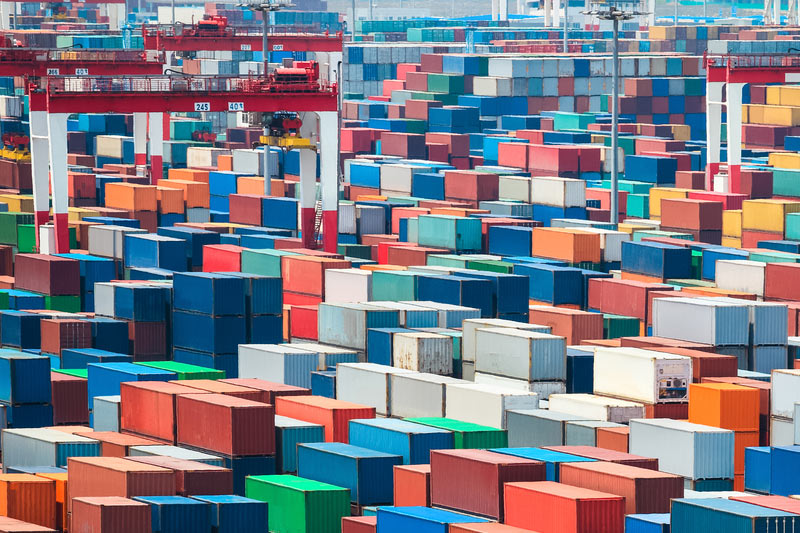By Tom Miles GENEVA (Reuters) - India has dealt a potentially fatal blow to the World Trade Organisation's hopes of modernising the rules of global commerce and remaining the central forum for multilateral trade deals.
In the short term, this is a setback for freer commerce. In the longer run, it means trade liberalisation may advance -- if at all -- among narrower groups of countries, denying dissenters a chance to block progress.
While the unwieldy 160-member, Geneva-based WTO will survive as a body for enforcing existing multilateral agreements, smaller clubs of like-minded nations are trying to move ahead faster to update the trade rules among themselves.
"Without a serious shakeup, the WTO's future looks like that of the League of Nations," said Simon Evenett, a professor at the Swiss Institute for International Economics. "Perhaps ultimately that's what some governments want."
Last week India vetoed the adoption of a treaty to simplify, standardise and streamline the rules for shipping goods across borders, having previously agreed to its terms at a ministerial conference in Bali last December. It blocked the text because it wanted more attention paid to its concerns over food security.
After drawing widespread condemnation, the world's second most populous nation now says it wants to keep the treaty alive, with stronger assurances about protecting its food security needs, until a permanent solution is found.
But the genie is out of the bottle. India's tactics reawakened a ghost from the WTO's past that many diplomats hoped to have put behind them: the idea of "linkages".
Linking unconnected negotiations was a major reason why the Doha round of trade talks that began in 2001 collapsed. As more and more states parlayed a concession here into a pledge there, the weight of interwoven bargains eventually caused paralysis.
The draft treaty on customs rules, known as "trade facilitation", was supposed to be something that everyone could agree on -- "low hanging fruit" that might reinvigorate a WTO laid low by a grinding decade of failed negotiations.
But there were few illusions about the WTO's overall health.
"The Doha Round has been dead at least since the last big push in 2011 failed," said Richard Baldwin, professor of international economics at the Graduate Institute in Geneva. "The Bali package was just a way of putting fresh flowers on the grave to remind people of what passed away.
"The big trading nations like India, the United States, the European Union, China and Brazil all went along with it since they wanted to keep the WTO looking relevant."
THE WTO GOES DARK
For several years, many of the bigger economies have been pouring their energies into new clubs aiming to liberalise trade in particular regions or in specific sectors of the economy.
"What WTO promoters fail to understand is that their forum competes with other vehicles for reform. Through poor design, bad luck and bad tactics, the WTO has handicapped itself in this race," said Evenett.
Of all the big economies, India has perhaps bet most on the WTO, with little progress in opening up bilateral or regional ties. Despite its role as a offshore services hub and its vast population, it has yet to sew up a bilateral trade agreement with the EU and an investment treaty with the United States.
The 28-nation EU and the United States, which are trying to negotiate a Transatlantic Trade and Investment Partnership, are among pioneers of the smaller clubs, but China is also involved.
Beijing is a member of groups trying to develop new standards for information technology products and environmental goods, and it wants to join one that is working to liberalise trade in services.
Last week's veto prompted some countries to discuss moving ahead with the customs treaty without India.
The last world trade agreement, known as the Uruguay round, was concluded in 1993 and came into force in 1995.
For businesses based on globally mobile funds, data and intellectual property, WTO rules that essentially pre-date the Internet era are hopelessly out of date. Proponents of the new deals think India's new government risks relegating its economy to bureaucratic backwardness if it won't join such reforms.
Some of the existing groups, such as the one on information technology, include the bulk of world exporters and can promise to share the benefits of freer trade with the entire WTO without fear of non-members gaining much from being free-riders.
Others, such as the one on services, will not share the benefits with non-members, at least until a critical mass of countries are inside the club. That could lead to a two-tier WTO in which the leading reformers have the best terms of trade.
Even if it benefits in the end, India will have missed the chance to shape the rules by not being from at the start.
India is also trailing in regional trade agreements, with the United States setting the pace by negotiating simultaneously a 12-nation Trans-Pacific Partnership (TPP) and a potential deal with the EU, which faces obstacles on both sides.
While such mega-regional agreements grab the headlines, Evenett said they may be almost as hard to clinch as WTO deals.
"Instead, watch out for more unilateral reforms by emerging markets and deals done directly between foreign firms and national governments -- all done a million miles from the WTO."
Informal groups such as the G20 might also be more active in promoting trade, although India is a member there too. Current G20 chair Australia said on Monday it wanted the grouping to do more to remove barriers to commerce.

Before India's veto, U.S. WTO Ambassador Michael Punke said the Bali deal had turned the lights back on at the WTO, but if India blocked the accord, it would "flip the lights in this building back to dark", with no return to business as usual.
"Many Members, including developing country members, have noted that, if the Bali package fails, there can be no post-Bali. It's with regret that we agree with them," Punke said.
(Reporting by Tom Miles; Editing by Paul Taylor)
